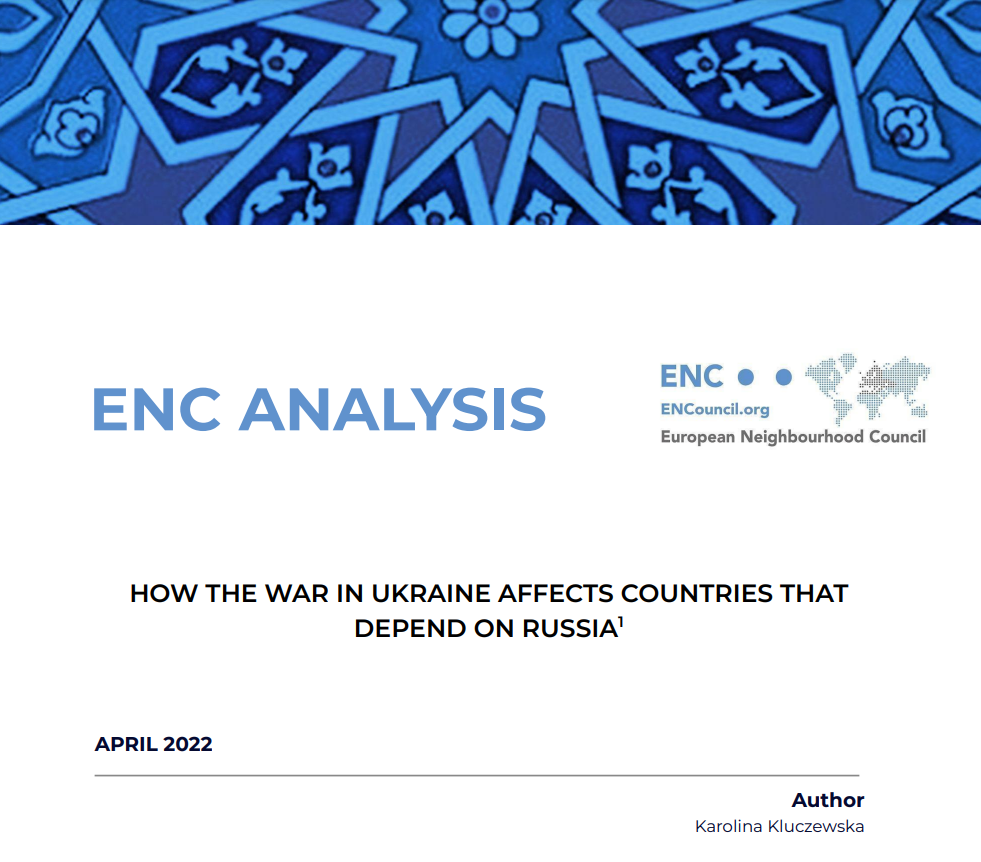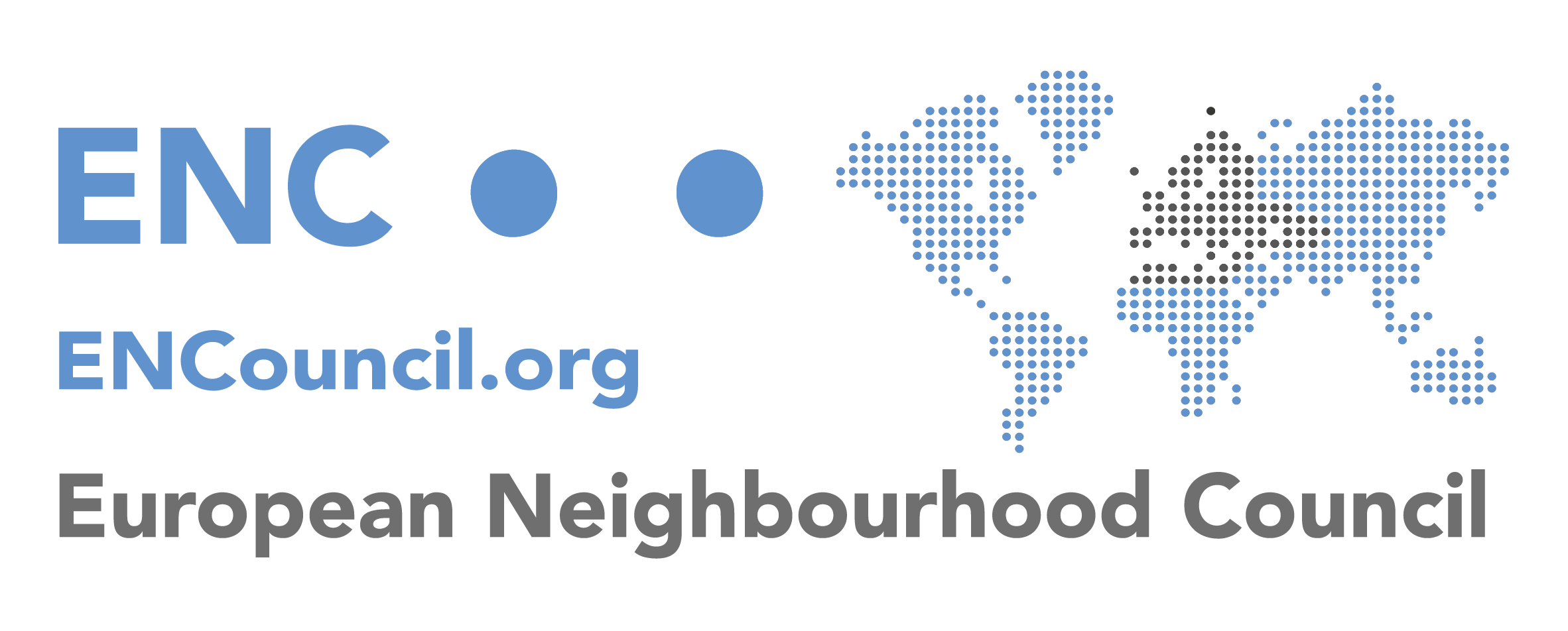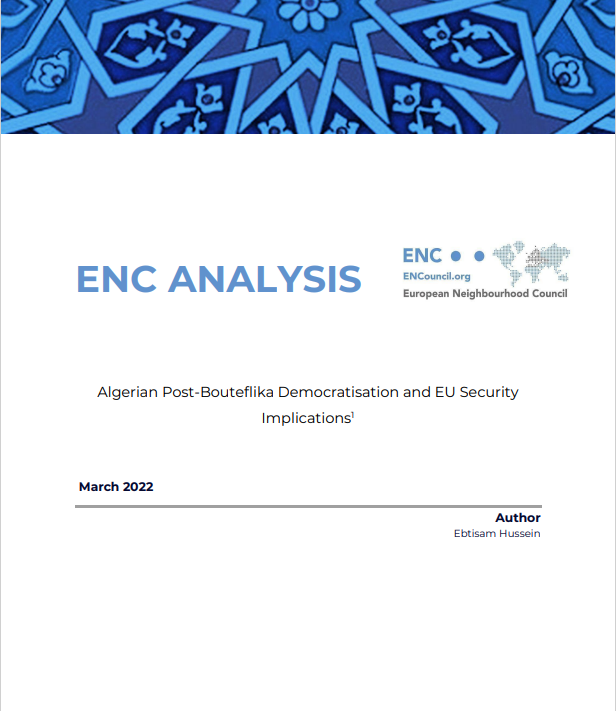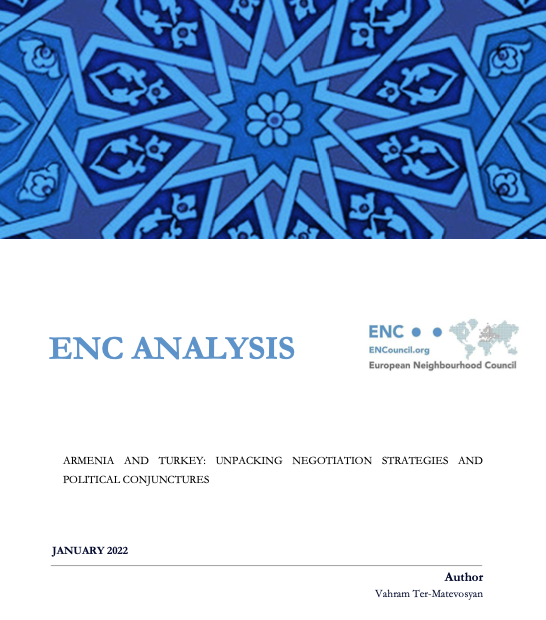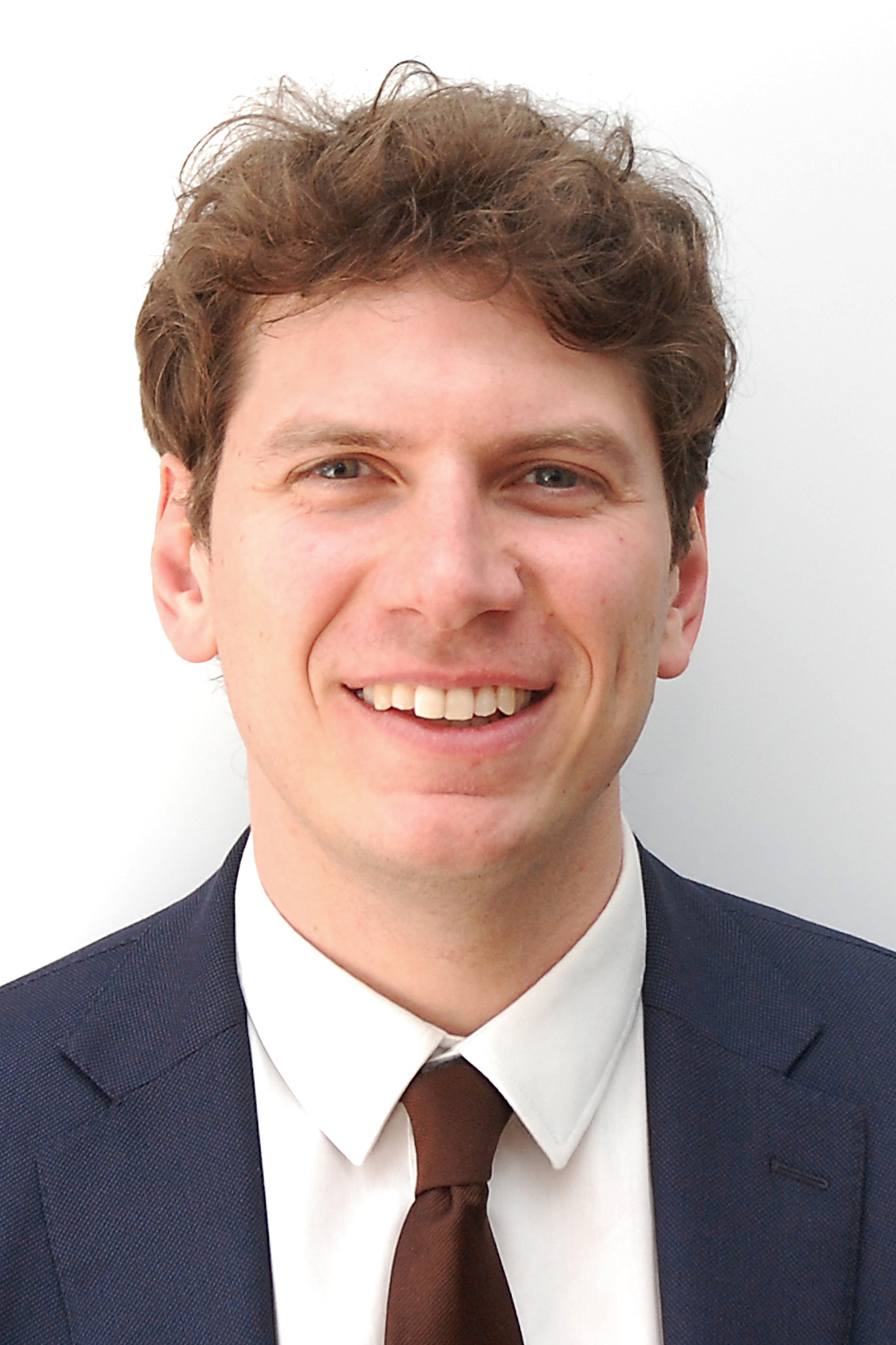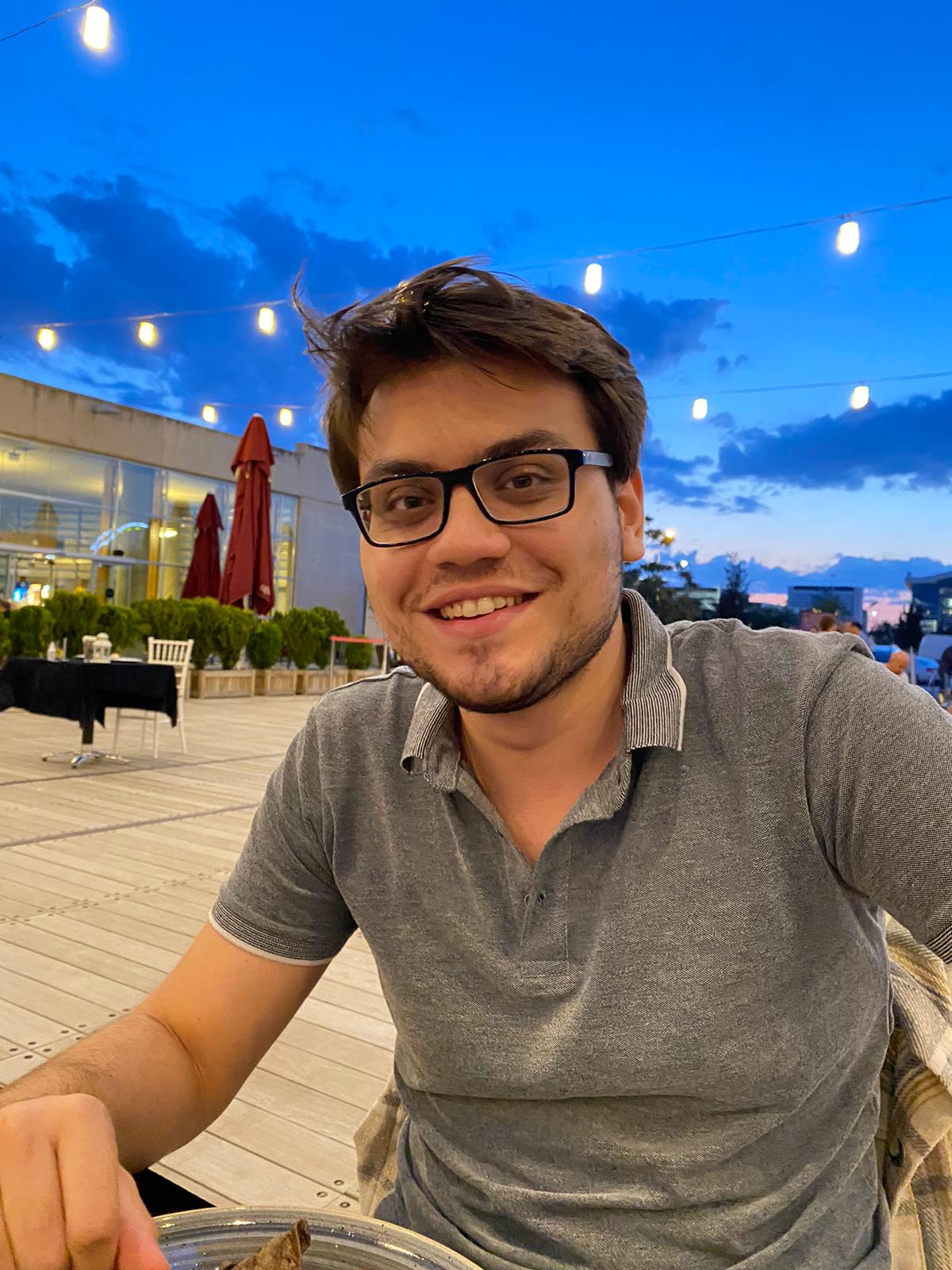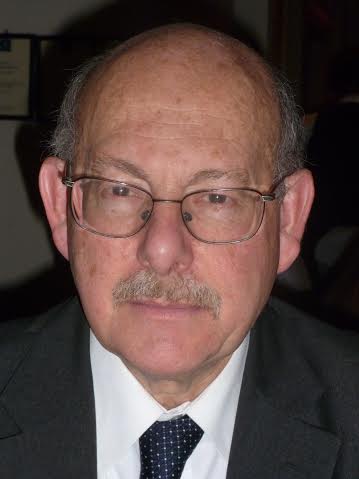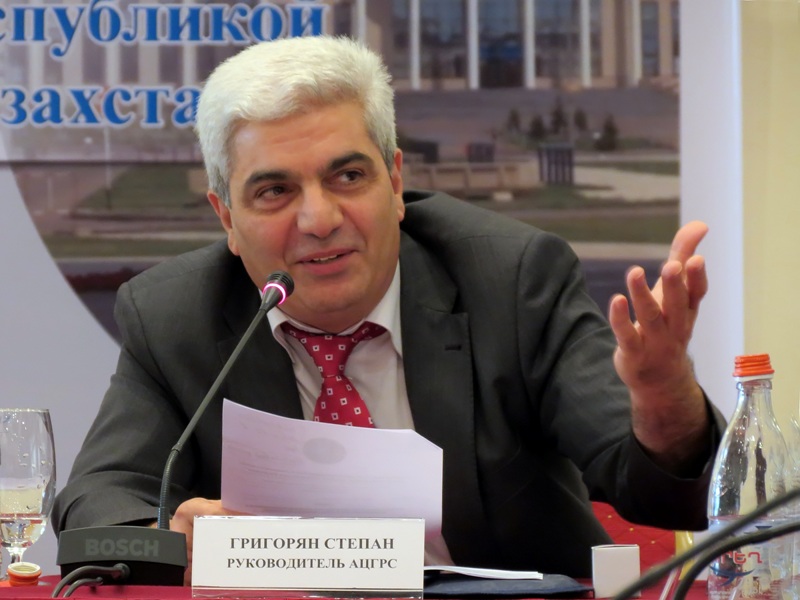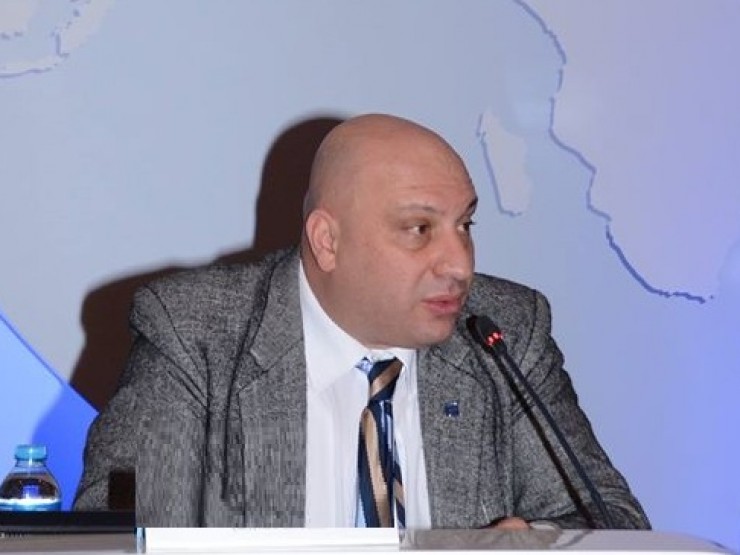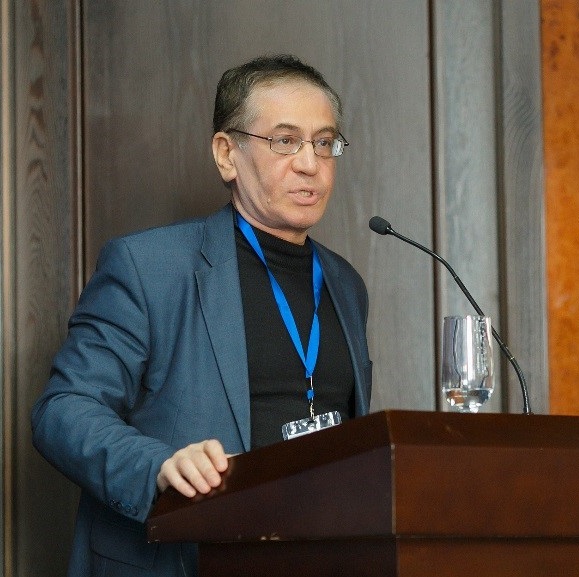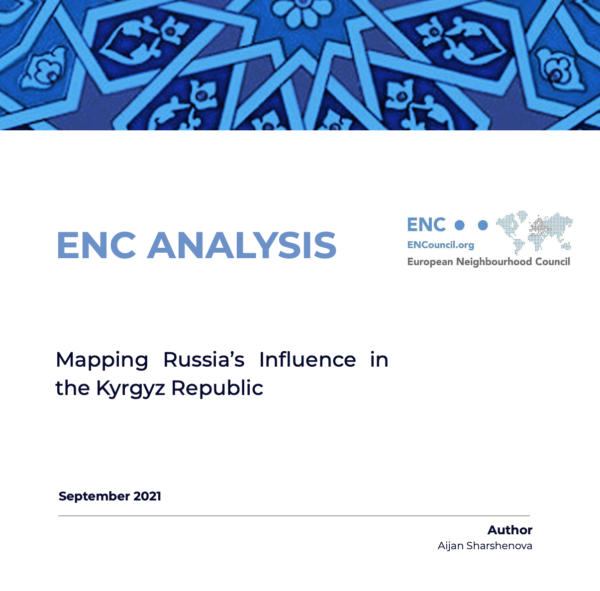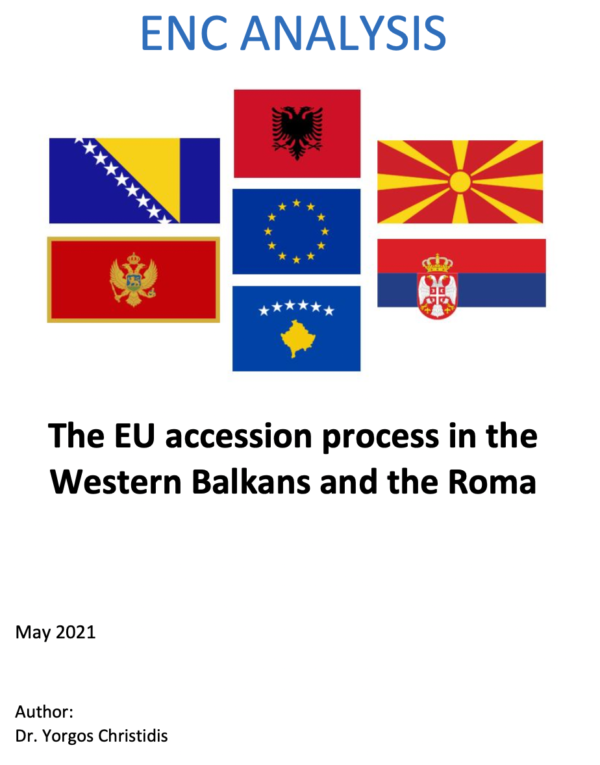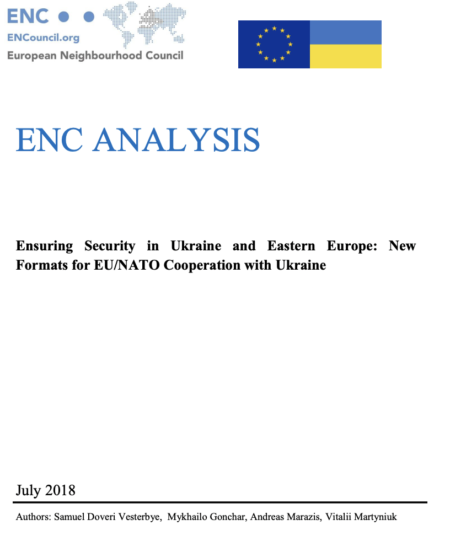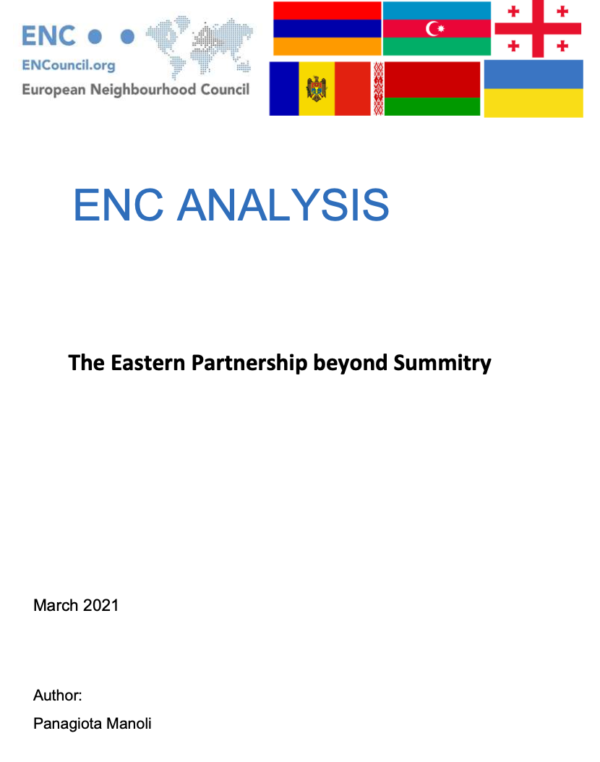ENC is a young and dynamic independent think tank, consisting of three full time researchers and project managers, one research assistant and two rotating internships, fundraising and external advisors. If you are interested in joining our team, please send us an email at media@encouncil.org
Team
Samuel Doveri Vesterbye is Managing Director at the European Neighbourhood Council (ENC) and specializes in Turkey, Central Asia and the Middle East. He oversees ENC research projects across the neighbourhood and Central Asia, including Academic Council Members and regional strategy. His research is focused on EU-MENA and EU-Turkey relations in trade, accession, energy, migration, and regional neighbourhood policy. He is the author of numerous research studies, including Palgrave Macmillan’s Managing Security Threats along the EU’s Eastern Flanks. Send Email: samuel@encouncil.org
Andreas Marazis is Project Manager and Researcher specializing in the Eastern Partnership countries and in Central Asia. His research is concerned with the post-Soviet space, particularly socio-political developments in Central Asia and the South Caucasus. Andreas Marazis is also affiliated researcher at
Vrije Universiteit Brussel (VUB) and associate researcher for
EUCAM. Before joining ENC, Andreas worked as a Junior Researcher and EUCAM Programme Officer for FRIDE, and as Project Manager for Eurasian Dialogue. Andreas holds a MLitt in Middle East, Caucasus and Central Asian Security Studies from the University of St. Andrews (Scotland, UK) and an MA in Black Sea Cultural Studies from the International Hellenic University (Thessaloniki, Greece). He is fluent in English and Greek. Send Email:
amarazis@encouncil.org
Maria Bevza holds the position of consultant at the European Neighbourhood Council. She has 9 years of experience in project development that she gained working for NGOs in Russia, the US and Kyrgyzstan. Before joining ENC she was a fellow at the United Nations Foundation. Maria holds a master’s degree from Lomonosov Moscow State University in Area Studies of Russia and a master’s degree at Paris-1 Panthéon-Sorbonne in Political Sciences. Maria speaks Russian, English and French.
Enea Shehaj is a Research and Project Assistant at the European Neighbourhood Council. His research is focused on Foreign Policy, Maritime Security and Blue Economy, Military Policy and Geopolitics. He is also a Research Analyst of Politico-Military Dimension at the Centre for Youth and International Studies. Enea holds an MA in International Relations and East Asia Studies, a BA (Pre-Master) in International Relations and International Organizations and a Bsc in Business Administration. He is fluent in English, Greek and Albanian.
Yagiz Dinc is working as communication assistant (intern) at the European Neighbourhood Council. He is a final year undergraduate student in Political Science and International Relations at the TOBB University of Economics and Technology. He is fluent in Turkish and English.
Asuman Kübra Baş works as a Communication Assistant (Intern) at the European Neighbourhood Council. She holds a bachelor’s degree in Sociology and a master’s degree in Political Science and International Relations. Migration, Syrian refugees, and Cultural Studies are the focus of her research. She speaks English and Turkish fluently and is learning German.
External Advisory Council
The external advisory council consist of an unlimited number of members from the private sector, public sector, civil society, think-tank and media. Members include ex-diplomats, editors-in-chief, advisors, ex-officials, businessmen/women, think-tank and researchers.
The external advisory council serves as an advisory body that helps foster support for projects, research and events, while providing guidance, experience and network.
ENC is required to listen to recommendations from external advisory council members if their concerns are considered relevant to a given field of research or project.
ENC reserves the right to select and amend any advisory council members’ status, with the exception of the ones bound by partnership agreements. Advice provided by the external advisors is not legally binding in terms of implementation, but ENC staff members are required to interact with external advisors annually.
External advisors are expected to:
– Present ENC with potential grant and tender proposals (minimum 1 per year), which are deemed relevant to ENC (e.g. ENP, EU Accession, Security/Defence, Turkey, Iraq, Ukraine);
– Provide advice and sharing of contacts with regards to funding, networks, and donors (through meeting with Managing Director minimum 1 per year);
– Provide advice with regards to ENC’s research orientation/priorities and projects.
External Advisors
Andrea Mogni
ENC External Advisor and Senior Consultant at the Advocacy Firm Alber and Geiger and Senior Expert at the Global Governance Institute.
Areas of Expertise: trade, economic relations, international relations, development, third country funding.
Country: Belgium
Professional Background: Dr. Mogni was Senior Policy Coordinator and Senior Financial Expert at the EEAS where he dealt with programming and financing instruments with neighbouring countries and countries in transition. Earlier he covered EU relations with the OECD, UN, IFIs and regional economic or-ganizations and banks. Dr. Mogni served in the EU Delegation and the Italian Ministry of Foreign Affairs.
Stepan Grigoryan
ENC External Advisor and Chairman of the Board of the Yerevan-based Analytical Centre on Globalization and Regional Cooperation (ACGRC).
Areas of Expertise: International Relations, Regional Development, Globalisation, Human Rights, Civil Society.
Country: Armenia
Professional Background: Dr. Grigoryan served for two years (1998-2000) as advisor to the Minister of Foreign Affairs of the Republic of Armenia as well as Permanent Representative of the Republic of Armenia in the Collective Security Agreement of CIS between1996-1999. He also served as Extraordinary and Plenipotentiary Minister of Armenia in the Russia Federation (1995-1998) and he was Member of the Armenian Parliament from 1990 till 1995.
Nika Chitadze
ENC External Advisor and Director of the Black Sea Region Geopolitical Research Center International Black Sea University and President of George C. Marshall Alumni Union, Georgia International and Security Research Center.
Areas of Expertise: International Relations, Black Sea region, Democracy, Security.
Country: Georgia
Professional Background: Mr. Chitadze served inter alia as advisor to the Deputy Minister of Defence (1998-1999) and as senior specialist for the Ministry of Foreign Affairs (1997-1998) in Georgia. He is the author of more than one hundred twenty policy and scholarly researches and articles including five books.
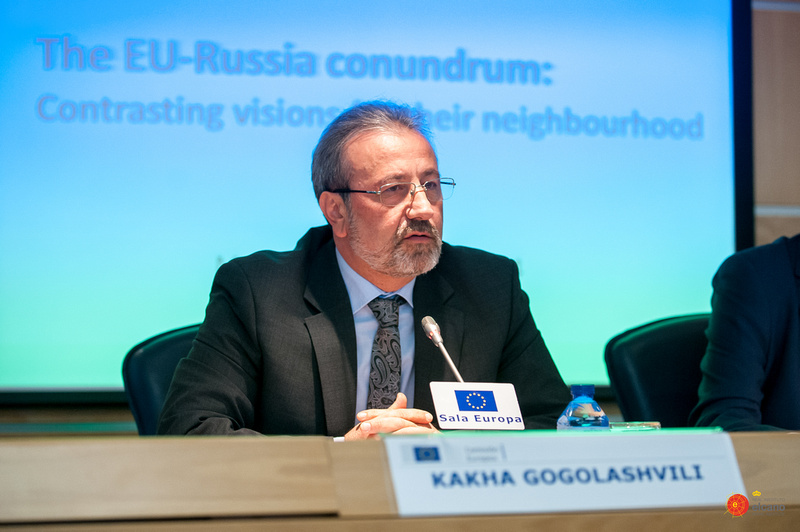
Kakha Gogolashvili
ENC External Advisor and Director of EU Studies at the Georgian Foundation for Strategic and International Studies (GFSIS).
Areas of Expertise: European Integration, International relations, Economics, Conflicts Resolution.
Country: Georgia
Professional Background: Mr. Gogolashvili served for eleven years in the Georgian Foreign Service as the acting Head of Mission to the EU, as well as the Director of Department for Relations with the EU. Since the early 2000s, he has actively been advising the Georgian Government on European Integration, while serving as the Chairman of EaP Civil Society Forum Georgia National Platform.
Pavlos Efthymiou
ENC External Advisor and the strategy and external relations adviser of the Hellenic Entrepreneurs Association (EENE) in Greece.
Areas of Expertise: European security and defence, EU – Mediterranean security policy, EU conflict prevention and peace promotion, EU foreign policy and external action, EU border management and security, EU counter-terrorism, and Chinese global influence.
Country: Greece
Professional Background: Mr. Efthymiou has his doctorate on European Security at the University of Cambridge. He holds an MPhil in International Relations from the same University and a first-class honours BSc in Politics with Economics from the University of Bath in the UK. Dr. Efthymiou has worked with a number of think tanks in Athens, London and Brussels, and has been working with the China-UK Development Council (CUDC) since 2012 where he has done extensive project organization and management. He has taught in numerous academic programs in the UK and Europe, including competitive programs of leading Cambridge and Oxford University Colleges. He has work experience in diplomacy, business and policy consulting, and systematically writes op-eds on current events. His side-passion is innovative, startup entrepreneurship which he tries to support and encourage in Greece and Europe.

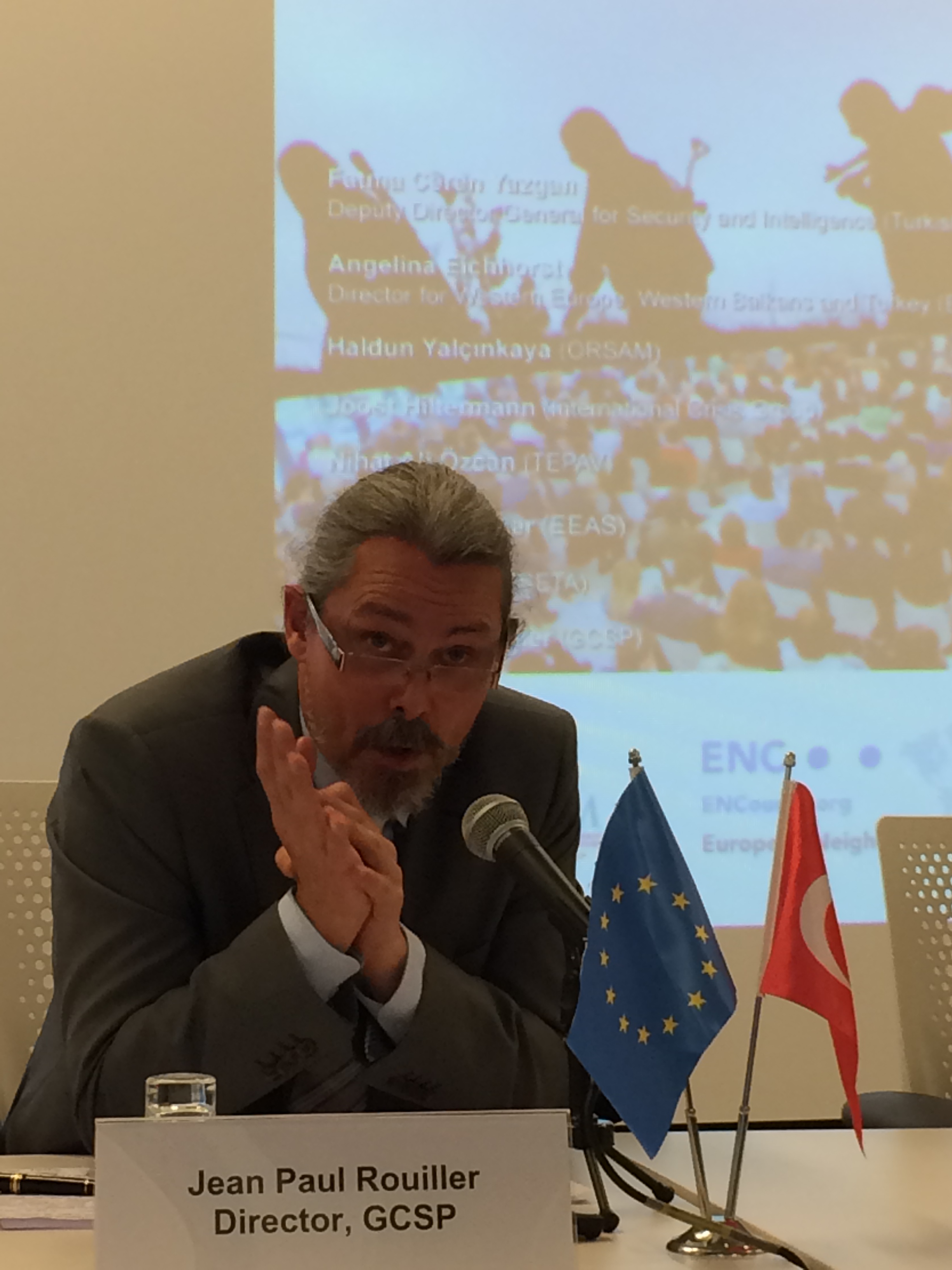
Jean-Paul Rouiller
ENC External Advisor and Director of the Geneva Centre for Training and Analysis of Terrorism (GCSP).
Areas of Expertise: Counter-terrorism, terrorism, radical Islam.
Country: Switzerland
Professional Background: Mr. Rouiller prior to his post at GCSP he worked for the Swiss Federal Office of Police (Fedpol) from December 2003 to January 2010, creating the first Counter-terrorism Unit within the Swiss Federal Criminal Police (SFCP). He then developed the structures and concepts of the first counter-terrorism analysis unit of the SFCP (in charge of intelligence collection and risk analysis in the field of counter terrorism and terrorism). For three years (2000-2003) he worked at the Office of the Coordinator of Intelligence Services of Ambassador Jacques Pitteloud, as Adviser on Homeland Security. He also served in the Swiss Intelligence Service from 1994 till 2000 where he took responsibility for all terrorism files; which include inter alia, Radical Islamic organizations, the ‘ethno-nationalists’ groups (e.g. IRA, PKK, LTTE or ETA) and the remnants of the far-left (e.g. 17N phantom group in Greece).
Jos Boonstra
ENC External Advisor and Europe-Central Asia Monitoring (EUCAM) Coordinator (Groningen, Netherlands).
Areas of expertise: Democratisation, Rule of law, Human Rights, EaP, Central Asia, Security Sector Reform.
Country: Netherlands
Professional Background: Until December 2015, Jos Boonstra was Head of the Eastern Europe and Central Asia programme at FRIDE in Madrid and Brussels and prior to that he managed a program at the Centre for European Security Studies (CESS) in Groningen.
Edward Lemon
ENC External Advisor and Postdoctoral Fellow at the Harriman Institute at Columbia University in USA.
Areas of Expertise: Religious extremism, Central Asia, foreign fighters, authoritarianism, security.
Country: United States
Professional Background: Dr. Lemon recently completed his PhD at the University of Exeter, where he wrote his thesis about Islamic extremism in Tajikistan. In particular, he focused on the ways in which the Tajik government pursues opponents living abroad. In October 2016, he will take up the position of Postdoctoral Fellow at the Harriman Institute at Columbia University. He has conducted extensive field research on religious freedom, migration, terrorism and political Islam in Tajikistan, Kyrgyzstan and Russia. His research has appeared in Central Asian Affairs, Foreign Affairs, The RUSI Journal, Caucasus Survey and Review of Middle East Studies.
Talant Sultanov
ENC External Advisor and Director of the Center for Silk Road Studies (Kyrgyz Republic)
Areas of expertise: Economic development, international relations, international finance, Eurasian affairs, Central Asia, digital societies, innovations and ICT
Country: Kyrgyz Republic
Professional Background: Talant Sultanov is a Chair of the Internet Society Kyrgyz Chapter, a Board member at the Bank of Asia in Kyrgyzstan and a Trustee at the Microcredit Foundation “Humo” in Tajikistan. Prior to his current positions, Mr. Sultanov has served as the Director of the National Institute for Strategic Studies of the Kyrgyz Republic. He has also worked as the CFO of the American University of Central Asia. Previously, Mr. Sultanov worked at the World Bank (Washington, D.C. and Almaty), and in Project Finance at Kazkommertsbank in Almaty. Mr. Sultanov is an alumnus of Harvard University, John F. Kennedy School of Government, Executive Education (2016). He holds a MA in Finance from Columbia University (2006) and a BA Summa Cum Laude from San Francisco State University (1999), where he graduated as the Top Student in the International Relations Program.


Michael Ryan
ENC External Advisor
Areas of Expertise: MENA Region and Africa
Country: Ireland
Professional Background: Michael Ryan is a retired European Union diplomat with 37 years experience in EU institutions and foreign policy. He served as EU Ambassador to Rwanda (2013-2018), Chargé d’Affaires of the EU Delegation to Syria (2012-2013), and as head of the political section in the EU Delegations to Syria (2011-2012) and to Egypt (2006-2011) during the Arab Spring and Syrian war. He has also served as an EU diplomat in Turkey, Israel and Jordan, and as desk officer/policy analyst for Lebanon. Michael Ryan – an Irish national – has expertise in security, democracy and economic issues prevalent in the Middle East and Africa, in development processes, human rights and governance, and public diplomacy. He is an alumnus of the Universities of Reading (MSc economics), St Andrews (development economics) and Zimbabwe (economics).
Shada Islam
ENC External Advisor and Foundress of New Horizons Project (NHP), a Brussels-based global strategy and advisory media company.
Areas of Expertise: Europe, Asia, Africa, Geopolitics, Trade, Migration, Inclusion, Diversity and Women’s Empowerment.
Country: Belgium
Professional Background: Ms. Islam is a member of the European Policy Centre’s prestigious Strategic Council and Senior Adviser for its Europe in the World programme. She worked for nine years as Director of Europe and Geopolitics at Friends of Europe, an influential independent think tank based in Brussels. She now runs her own Brussels-based global strategy and advisory company, New Horizons Project.


Pepijn Kennis
ENC External Advisor and Politician for the Civil Movement Agora.
Country: Belgium
Professional Background: Pepijn Kennis studied sociology and urban geography at the Vrije Universiteit Brussel and urban development at the universities of Brussels, Copenhagen, Vienna and Madrid. After his studies, he started in 2012 as a volunteer at Toestand vzw, an organisation that transforms vacant buildings into temporary accommodation for socio-cultural projects. In 2014 he became coordinator there. He also became a member and director of the Belgian environmental organisation Bral, the Koekelbergse Alliantie van Knutselaars (K.A.K.), project manager Growfunding and guide organisation Brukselbinnenstebuiten.
Sanem Guner
ENC External and Assistant Director of the Hollings Center for International Dialogue.
Areas of Expertise: Turkish and U.S. Foreign Policy in the Middle East and North Africa, Human Security, Islam and Democracy.
Country: Turkey
Professional Background: Sanem was a program officer at the Turkish Economic and Social Studies Foundation (TESEV) where her portfolio included projects on Turkey-EU relations, women’s political participation in Turkey and the Middle East, Turkish rapprochement with Armenia, and the peace process in Cyprus. Sanem graduated Bryn Mawr College with a BA in Political Science, and went on to complete an MA in International Relations at Istanbul Bilgi University.

Ronald Meinardus
ENC External Advisor
Areas of Expertise: Greek-Turkish issues, Greek domestic and foreign politics, EU-Turkey relations, the role of Germany in Southern Europe and developments in the Arab world.
Country: Germany
Professional Background: Dr. Meinardus is a political analyst and commentator who started his professional career in journalism at Germany’s international broadcaster – first as economics’ producer, later as Head of Deutsche Welle’s Greek program. A passion for liberal politics and advocacy took him to the Friedrich Naumann Foundation for Freedom (FNF) and assignments in Greece, South Korea, the Philippines, Egypt, India and Turkey. Apart from managing political projects and writing commentary and analytical papers, Meinardus is a qualified facilitator and consultant focusing on strategic planning and political communications. More information and links to selected publications at www.meinardus.info.
Parviz Mullojanov
ENC External Advisor and Chairman of the Board of the OSI (Soros Foundation) inTajikistan and senior adviser of the International Alert office in Tajikistan.
Areas of Expertise: Human rights, Islamic studies.
Country: Tajikistan
Professional Background: Dr. Mullajanov received his PhD in Islamic studies at the University of Basel in Switzerland. Dr. Mullojanov is a former member of the Inter-Tajik Dialogue, a peaceful international civil initiative during the civil war in Tajikistan and former member of the EUCAM (EU and Central Asia Monitoring) research group. He worked for various international agencies and organizations such as Human Rights Watch in Helsinki, UNCHR, UNDP and ADB.

Nejla Ayvazi
ENC External Advisor and Adjunct Instructor for Social Sciences at ADA University.
Areas of Expertise: International Cooperation, EU Eastern Partnership, Sustainable Development, Minority Rights, Peacebuilding, Policy Advocacy and Leadership.
Country: Azerbaijan
Professional Background: Ms. Nejla Ayvazi is Adjunct Instructor of Leadership, Ethics and Communications at ADA University in Azerbaijan. She was the Senior Expert for EU Summer Schools development and training within an EU funded project at the EU Centre of Excellence at ADA University. In 2018-2019 she worked for UNDP in support of nationalization of the Sustainable Development Agenda in Azerbaijan. Previously, she worked at OSCE in Baku and an OSCE HCNM funded project on minority protection and language rights at the European Centre for Minority Issues in Kosovo. Her professional experience includes working in the UN System in Baku, Azerbaijani Embassy in Lithuania and Irish Embassy to Lithuania and Belarus. Nejla holds a Master’s degree in Economics from Vilnius University and Bachelor’s degree in Law from Baku State University. She speaks English, Russian, Azerbaijani, French, Albanian, Bosnian/Serbian and some Lithuanian.

